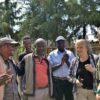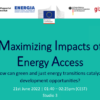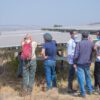Energy communities for sustainable energy solutions in sub-Saharan Africa

Energy communities can play an important role in the global energy transition for providing energy for all. Until now, they have only done so to a limited extent. The reasons are manifold. Led by Kenyan scientist Amollo Ambole, four authors from Kenya and South Africa identify conditions for positive developments for community energy in a recent study and show solutions how these processes can succeed. In this interview, two of the study’s authors, Douglas Logedi Luhangala and Kweku Koranteng, explain which alternative paths for energy access make sense.
In your 2021 study on energy communities in sub-Saharan Africa, you evaluated the research on energy communities in the 46 countries in sub-Saharan Africa. You found that only a few of the energy projects analysed have the characteristics of energy communities. Why are there still very few energy communities in sub-Saharan Africa?
Douglas Logedi Luhangala: There are several reasons for this. Energy communities are still seen more as social initiatives that are less profit-oriented. In a capitalist world, private initiatives may develop a greater commitment because they have a financial interest attached to it. Therefore, business people are more oriented towards these private sector solutions and tend to put more publicity and financing for public buy-in.
Kweku Koranteng: Moreover, these private initiatives have the advantage that the legal framework for them is clearly formulated, whereas it often remains vague for energy communities. In addition, community-based initiatives find it much harder to get funding. Conversely, this means that the content of energy communities or community energy projects is strongly determined by the financing system and conditions.
What do you consider your most important findings of the study?
Douglas Logedi Luhangala: In a world where energy transitions are becoming critical, energy communities are important in creating buy-in to sustainable energy solutions. In our view, energy communities can be a path to equity and energy justice if they use effective strategies to engage stakeholders, especially potential users. Such engagements should be done in a way that all stakeholders feel fully involved and develop a larger sense of ownership of the energy initiatives.
What does it take for that to happen?
Kweku Koranteng: For energy communities to play this role, there needs to be an enabling policy environment that allows communities to use their structural and symbolic resources, mobilise, influence policies, build a strong identity and actively participate in meeting their energy needs collectively and sustainably.
What do you mean with symbolic resources?
Kweku Koranteng: This refers to less tangible factors, for example the desire for a strong and self-reliant community or identity. Both of these can be powerful motivators.
Douglas Logedi Luhangala: In terms of process, they need support in setting up socio-technical configurations that provide solutions for needed products and services. However, you also need to look at the economic dynamics where factors like disposable income and the ability to pay for any new energy solutions affect the ability of energy communities to bring their people into new energy forms and solutions.
What prevents local authorities or citizens from acting?
Douglas Logedi Luhangala: In many countries, the former act at the behest of the national government. Against the background that there is only a vague legal framework for energy communities, municipal officials act more hesitantly than necessary. In many village communities, the seniority principle plays an important role. Convincing these authorities of technological or social innovations is therefore not easy. Transitions need to be systematic and planned.
What role do the African governments play?
Kweku Koranteng: In many African countries, energy supply is a national issue. Regional and especially municipal authorities have only limited or no influence. National governments tend to look only at the meta-level. They rarely consider the needs of people in rural areas. They do not know the conditions and having to manage on one US dollar a day is beyond their imagination.
Douglas Logedi Luhangala: The consequences are solutions imposed on inhabitants in case of doubt. This creates resistance and rarely works, as we can see from all the development ruins, not only in Africa.
What alternatives do you propose?
Douglas Logedi Luhangala: We need new models of participation and decentralisation that take into account the needs of local people. And we must finally stop developing solutions for Africa or one African country. Each country is diverse, and the regions in each country or the municipalities also differ significantly. We need customised solutions, developed with the people on the ground. That is why we recommend in our study, and many other studies, a co-designed solution to the energy transition. Such a solution includes initiatives and considerations by all stakeholders for all stakeholders.
Kweku Koranteng: In our study, we propose stakeholder engagement strategies and a co-design approach. This approach involves different stakeholders, at the community level for example women’s, savings or youth groups, village communities and cooperatives. There are also actors from science, non-governmental organisations, governments and institutions. On the one hand, we see these as intermediaries in building partnerships and cooperation. On the other hand, they can identify people who can also actively work for solutions on the ground. If we develop solutions from the bottom up, in case of doubt they will be more suitable and better accepted.
What is the task of these community energy brokers?
Kweku Koranteng: Take an informal settlement or a rural region. The government planners are mostly from cities. Villagers’ needs are foreign to them, and only a few know how an informal settlement works. Then again, villagers lack both planning expertise and access to finance. Between the two, there is a lack of intermediaries between the local people and government agencies that can reduce the pressure between the actors and facilitate cooperation. We see this as a very important prerequisite for good solutions.
Can you give an example of these new ways?
Kweku Koranteng: The iShack project in the informal settlement of Enkanini near Stellenbosch focuses on the potential of self-help to improve energy supply. Instead of telling people what they need, iShack first gathered these needs together with the community. Today, many residents get electricity from a solar home system (SHS) to light their shacks, charge their mobile phones, and power their radios and televisions. The SHS does not belong to the residents, they pay a basic fee of 150 Rand (not even eight Euro) per month. If they do not pay, power is switched off. At least as important to iShack is the development of a sustainable social enterprise model that provides affordable, incremental services to residents of informal settlements. And at the same time creates jobs that empower residents.
How do you see the role of international development cooperation?
Douglas Logedi Luhangala: International organisations can achieve a lot because they provide expertise and financial resources. There are many small interventions and pilot projects though. These projects usually have a short duration, but we need much more time for sustainable cooperation with energy initiatives and communities. That is why we advocate for long-term programmes that are more oriented towards the needs of the people and, above all, promote rapid dissemination.
About the authors
Douglas Logedi Luhangala holds a Masters Degree in Climate Change and Adaptation from the University of Nairobi and works with Green Heart of Kenya. He is a researcher with Institute for Climate Change and Adaptation.
Kweku Koranteng, Climate and Energy Resilience Professional at ICLEI Africa and Doctoral Fellow at the School of Public Leadership, Stellenbosch University.
Dr. Amollo Ambole works with Big Win Philanthropy, having previously worked as a lecturer and senior researcher at the University of Nairobi attached to the Arts and Design Department and the Institute for Climate Change and Adaptation.
Peris Njoroge holds a PhD in Climate Change and Adaptation from University of Nairobi and currently works with World Safari Rally Kenya. Sshhee is a researcher with the Institute for Climate Change and Adaptation.





